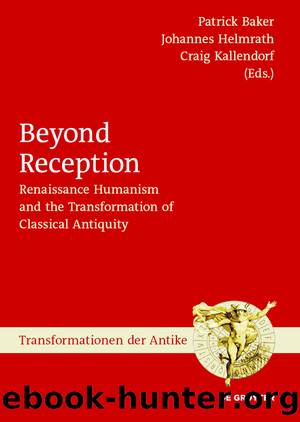Beyond Reception by Baker Patrick.;Helmrath Johannes.;Kallendorf Craig.;

Author:Baker, Patrick.;Helmrath, Johannes.;Kallendorf, Craig.;
Language: eng
Format: epub
Publisher: De Gruyter
Published: 2019-02-15T00:00:00+00:00
Jill Kraye
Renaissance Humanism and the Transformations of Ancient Philosophy
In this chapter, I will present a survey of the different ways in which Renaissance humanists transformed ancient philosophy from the mid-fourteenth to the mid-seventeenth centuries. To do so, I will review the scholarship produced over the past forty years or so on Renaissance Aristotelianism, Platonism, Stoicism, Epicureanism, and skepticism in light of the types of transformation set out in the classification devised by the members of Sonderforschungsbereich 644, âTransformationen der Antike.â390 My aim is to see whether pouring old historical wine into new terminological bottles can help to highlight the contributions made by humanists, not merely to the passive transmission of ancient philosophy, but also to its active transformation.
Recognition of the role played by the humanists in Renaissance philosophy has long been hindered by the conventional wisdom that humanism and philosophy were two very distinct enterprises, carried out by scholars with different training who deployed different methods to achieve different goals, and for whom moral philosophy was the only common ground. I want to give a very brief explanation of the background to this paradigm. In a seminal article entitled âHumanism and Scholasticism in the Italian Renaissance,â391 Paul Oskar Kristeller set out his famous and much repeated formulation that âthe studia humanitatis were considered as the equivalent of grammar, rhetoric, poetry, history, and moral philosophy.â392 This attempt to downgrade humanism to a âlimited place within the system of contemporary learningâ was in response to what he described as âthe modern and false conception that Renaissance humanism was a basically new philosophical movement.â393 Countering an interpretation current in the early and middle decades of the twentieth century that humanism was âthe new philosophy of the Renaissance, which arose in opposition to scholasticism, the old philosophy of the Middle Ages,â Kristeller maintained instead that humanists were âprofessional rhetoriciansâ whose works âhave nothing to do with philosophy even in the vaguest possible sense of the termâ and whose âtreatises on philosophical subjects ⦠appear in most cases rather superficial and inconclusive.â The Italian humanists, he insisted, were âneither good nor bad philosophers, but no philosophers at all.â394 Like everyone working on Renaissance humanism and philosophy, I have enormous respect for Kristellerâs achievements in both fields; nevertheless, I believe that his influential determination to keep those fields separate has made it difficult to appreciate the extent to which they interacted in the Renaissance, if not so much on the institutional level of university teaching, then at least in the wider cultural and intellectual context.
It is also important to bear in mind that the boundaries between Renaissance humanists and philosophers were often blurred and porous. So, for a humanist, Justus Lipsius was a pretty good philosopher â though not perhaps, as a present-day practitioner of the discipline has remarked, âa philosopherâs philosopherâ;395 while Marsilio Ficinoâs linguistic and scholarly abilities as a humanist were the bedrock of his philosophical achievements. Paolo Beni was a professor of philosophy in Rome, but in Padua he held a chair of humanities.
Download
This site does not store any files on its server. We only index and link to content provided by other sites. Please contact the content providers to delete copyright contents if any and email us, we'll remove relevant links or contents immediately.
Cecilia; Or, Memoirs of an Heiress — Volume 3 by Fanny Burney(30933)
Cecilia; Or, Memoirs of an Heiress — Volume 2 by Fanny Burney(30889)
Dialogue by Robert McKee(3582)
The 101 Dalmatians by Dodie Smith(2933)
Bound by Hatred (The Singham Bloodlines Book 2) by MV Kasi(2690)
Harry Potter and the Cursed Child - Parts One and Two by John Tiffany(2524)
The Beautiful Boys: A High School NA Reverse Harem Paranormal Bully Romance (Shadowlight Academy Book 1) by Gow Kailin(2498)
The Art of Dramatic Writing: Its Basis in the Creative Interpretation of Human Motives by Egri Lajos(2411)
Carrie's War by Nina Bawden(2099)
Angels in America by Tony Kushner(2047)
Unlaced by Jaci Burton & Jasmine Haynes & Joey W. Hill & Denise Rossetti(2020)
A Clockwork Orange by Anthony Burgess(1936)
The Femme Playlist & I Cannot Lie to the Stars That Made Me by Catherine Hernandez(1889)
Drama by John Lithgow(1882)
Open Book by Jessica Simpson(1795)
Outside Woman (BWWM Amish Romance) by Stacy-Deanne(1737)
Terrorist Cop by Mordecai Dzikansky & ROBERT SLATER(1716)
Yerma by Federico García Lorca(1636)
Leo's Desire by Sundari Venkatraman(1591)
